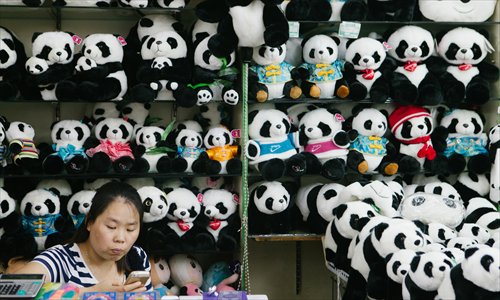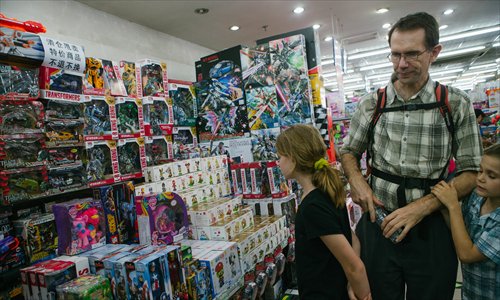The end of an era
Beijing’s popular toy market to close down

The Hongqiao Tianle Toy Market is to close down by October 31. Photo: Li Hao/GT
The venue of Wang Yuan and his girlfriend's date last Saturday was extra special. Although they are in their 20s, they went to the Hongqiao Tianle Toy Market in Dongcheng district, where most of the regular customers are little children and their parents.
The reason for the couple going to the market was different. They wanted to reminisce about their childhood and relive their happy memories as two carefree children, before the market closes down on October 31.
"We have known each other since we were in kindergarten and our favorite place to visit at that time was this market," said Wang. The couple said they both felt very sad knowing that it will be shut down soon. "We are getting married next year, and we were even thinking of bringing our future children here to buy toys, but it's impossible now."
The Hongqiao Tianle Toy Market has become an institution for many Beijingers, who have fond memories of buying toys here. The announcement of its closure was made last month, in accordance with the policies of the Dongcheng district government and the Beijing municipal government to optimize the capital's core functions. This includes moving away and closing some manufacturing enterprises, logistics bases, and large wholesale markets, like the 5,000-squaremeter Hongqiao Tianle Toy Market.
In the wake of its imminent closure, many people have been revisiting the market, especially those in their 20s and 30s, who are reluctant to part with a place that is full of memories.







Customers buy toys from the Hongqiao Tianle Toy Market. Photos: Li Hao/GT
Last toy fun
Sale signs and temporary hand-written price tags bearing marked-down prices are now a common sight at the toy market. A few sellers have already moved out, but the market is still enjoying brisk trade. Wang and his girlfriend bought a fishing toy - the same as the one they played with together during their childhood.
"I broke the toy and she cried for several days and wouldn't talk to me," Wang recalled. "Now I bought a new one which I will not break this time, because we want to save it for our children."
Paul Douglas, a father of five children, was also among one of the last shoppers taking his youngest daughter and son, aged 9 and 10, to buy toys. "They've been earning pocket money by doing housework and they can choose the toys they want," said Douglas. "My daughter has bought a helicopter, and my son wants another helicopter or plane."
Douglas said since the market opened in 2000, his family have been visiting it frequently, and almost all his children's toys were bought at the market, including his oldest son who is now in his 20s. "We have been coming here for 15 years and we really enjoyed it. It's a bit sad that it is closing."
Not only regulars, but also first timers have enjoyed the toy market. Tourists Bogdan Russo and his 10-year-old son Dudol from Romania, visited the market on their first trip to China.
"The market is a nice and different place with many toys we've not seen before. If it's closed, I think many children will be unhappy, both tourists and locals," said Russo, who bought Dudol a wooden magic wand and several Harry Potter badges.
Where to next?
Unlike the wholesale clothes markets near the Beijing Zoo, which were given a place to relocate to, no alternative location has been arranged for the hundreds of sellers at the toy market to continue their business after October.
"We don't know where they'll be moved to and it's not our responsibility to relocate them," said an anonymous staffer in the market's management office. "We just follow government's orders."
Zhang Yuzhao, a seller on the fourth floor who sells toys made out of straw plaits and clay figures, told Metropolitan that all the merchandise in her shop is being sold at half price to get rid of the stock before closing. The sale could result in losses of over 50,000 yuan ($7,825 ).
Zhang and her husband have been working at the market for more than 10 years. "We are getting old and have no entrepreneurial passion any more," said Zhang. "We looked for a new place to continue my business, but the rent is higher, so we are thinking of giving it up completely and to retire in my hometown in Henan Province."
Another seller at the market for the last five years, Wu Qilian, said he rented a shop in the nearby Tianya Market. According to Wu, there he will attract more customers, mostly foreigners. "Most sellers there sell clothes. The shop I rented is very small and the rent is rather high," said Wu. "So I will also open an online shop on Taobao."
Both Zhang and Wu said they were not surprised to learn that the market would be closed down, for many other wholesale markets downtown have been either moved out of Beijing or closed. "We support the government's policies, but we're reluctant to part ways with the other sellers and old clients," said Wu. "They're like my old friends."
Developing the outskirts
Over the past three years, many markets in Beijing have been moved out of the city to Hebei Province or closed down completely, including those near the zoo and Dahongmen areas. In earlier August, another 350 clothes sellers at the Tianhaocheng Market near the zoo were moved. The building is set to be renovated and turned into a new, high technology industries incubator.
According to a Beijing Times report in January, Wang Zhonghua, vice district mayor of Dongcheng district, said the toy market's closure was not intended to drive out the toy sellers. Rather, the intention was to upgrade the industry infrastructure in Beijing to introduce more high-tech and low-carbon enterprises, which is in line with an international metropolis and the capital's future development.
Wang Zhonghua said there were 40 markets in Dongcheng district at the beginning of 2015. Between four and six of them will be closed within the year, including the Hongqiao Tianle Toy Market.
According to Jiang San'geng, vice president of the Academy of Metropolis Economic and Social Development at Capital University of Economics and Business, it is a good move for Beijing to "get thinner" by optimizing the core functions of the capital, including getting rid of wholesale markets selling low-quality products.
"We should learn from countries like the US," Jiang told thepaper.cn in July.
"In Washington DC, there are not many industries and enterprises, which avoid industrial agglomeration and related population expansion."
Moving some markets and closing others are meant to encourage business development on the outskirts of Beijing.
Deng Wenyan, a marketing specialist of New Market, a new large-scale wholesale market in Tongzhou district, has been trying to persuade the Hongqiao Tianle sellers to move there.
"We have convenient transportation, low rent and good infrastructure, but still not so many sellers because they think Tongzhou is far away," said Deng.
"But the New Market is at least twice the size of the Hongqiao Tianle Toy Market. The more sellers who move here, the more business opportunities they will have, according to the small business aggregation effect," she said.
"I think in the future, for a wholesale market, the advantages lie in easy transportation options rather than distance from the downtown area."